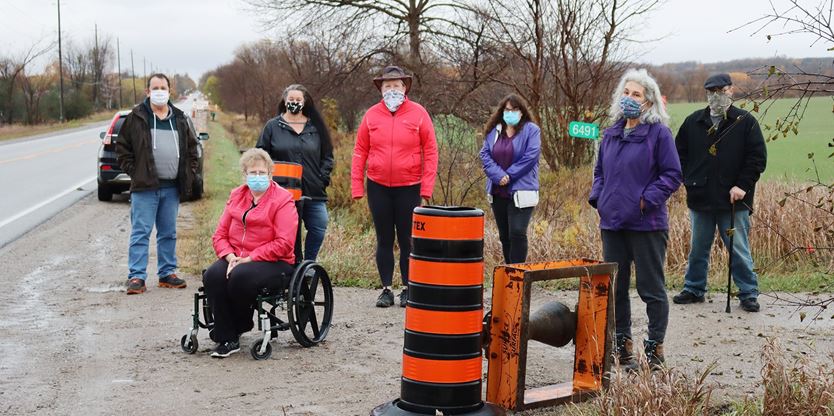Longtime Beeton resident Niall Lawlor admits he was excited when he first heard about a proposal to bring more affordable housing for seniors to the community, but those feelings quickly faded as he started digging through the details.
Instead of going through the normal planning approval process at the local level, the developer is seeking a minister’s zoning order (MZO), a lever the province can pull to fast-track developments without having to seek input from the public.

FLATO did not respond to Simcoe.com’s requests for comment.
The developer has said the community would be geared toward seniors and provide attainable housing with five apartment buildings, comprised of 400 rental units total, plus 173 townhomes, 40 semi-detached units and 297 single-detached homes.

Council, which voted 7-3 in favour of the request, has directed staff to come up with a list of conditions to send to the province in its letter of support – a move that seems backwards to Lawlor.
“It is like trying to stop the bulldozer after gassing it up and handing the keys to the driver,” he said.

He thinks Simcoe County, not a private developer, is the only partner the town should be working with in order to bring true affordable housing to the area.
Lawlor looked into an adult lifestyle community FLATO built in Dundalk, where rent for a studio apartment goes for $1,545 per month, a one-bedroom is $1,745 and a two-bedroom costs $2,045.
Deputy Mayor Richard Norcross, one of the most vocal proponents of the request, pointed out how local organizations like the food bank and Out of the Cold shelter in Alliston have said more affordable housing would alleviate the pressures they are facing. He also argued that the province would make a ruling regardless of the municipality’s decision.
Norcross, who previously served as Beeton’s councillor, has asked for the zoning order to require the development be used for seniors housing, and for a demographic study to be completed early on to determine who is living there.
Beeton Coun. Stephanie MacLellan, who opposed the request along with councillors Michael Beattie and Shira Harrison McIntyre, questioned why the developer wasn’t interested in trying to get the plan approved at the local level, and why council wasn’t taking more time to consider the proposal.
MacLellan also noted that there have been no previous cases of MZOs being approved without the local council’s support, and a spokesperson for the Ministry of Municipal Affairs and Housing reinforced this.
“Only if the municipality supports the project and sends a request for an MZO will the minister then consider the proposal,” wrote spokesperson Conrad Spezowka. “It is under the minister’s sole discretion whether to make a Minister’s Zoning Order or not.”
The town report on which council based its decision did not include such clear language about the role the municipality plays in the approval process, noting only that the minister “would consider any comments that council wishes to provide before such a decision is rendered.”
The report does say the approval of an MZO is at the “sole discretion of the minister” and is “typically used when local and provincial priorities align.”
Resident Nicole Cox said this decision has also created uncertainly for Tottenham’s future water supply and whether the pipeline extension will still be able to supply both communities.
The town’s director of engineering has said insufficient information has been presented thus far to address this concern.
Cox also echoed comments from the town’s director of planning regarding the town’s inability to guarantee this development remains exclusive to seniors.
“We have no tools or controls within our municipality that permit for discriminating toward those having the ability to purchase homes within the development,” she said.
Resident Barbara Huson criticized council’s decision in an open letter.
She referenced comments from the City of Barrie, which describes the MZO process as essentially “an end-run on local planning and transparent decisions that are made in the public interest.”
She said previous planning documents, studies and master plans that were developed with input from residents have been “rendered useless” with this single decision.
She said the proposal ignores one of the requirements in the official plan, which states no new development be approved outside the current settlement boundary until the master drainage plan is completed. The first phase of the study was recently completed, but there are still two more phases to go.
There are many other aspects of this proposal that worry her, including the fact that the homes would be located 500 metres from Beeton’s border and 2.25 kilometres away from the Foodland plaza where most residents do their shopping. The development would also be separated from the rest of the community by the Beeton Creek and floodplain.
The developer has proposed building a sidewalk along County Road 1, but it’s unknown if this is even possible since it would have to run parallel to a busy highway.
Huson was also alarmed by the traffic study, which estimates daily vehicle trips would triple from 4,500 to 12,243 once fully built out.
In her view, council essentially “handed off the keys” to planning and growth decisions to a developer and the province, while councillors “naively climbed into the back seat to see where the ride would take them.”
Resident Carolyn Milne called the decision “heartbreaking,” and said council has opened the door for more developers looking to do the same.
Since this decision was made, . Two of the applications will be discussed at the Nov. 2 council meeting.
STORY BEHIND THE STORY: After reporting on council’s controversial decision to support FLATO’s zoning request for a mega-development in Beeton, Simcoe.com asked residents to share their opinions.
